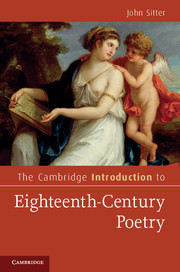Book contents
- Frontmatter
- Contents
- Acknowledgments
- Note on texts and titles
- Introduction
- Part I Voice
- Chapter 1 Voice in eighteenth-century poetry
- Chapter 2 The heroic couplet continuum
- Chapter 3 Vocal engagement: reading Pope’s An Essay on Criticism
- Chapter 4 Talking in tetrameter
- Chapter 5 Blank verse and stanzaic poetry
- Part II Poetic consciousness
- Part III Vision
- A concluding note: then and now
- Notes
- Further reading
- Index
Chapter 5 - Blank verse and stanzaic poetry
from Part I - Voice
Published online by Cambridge University Press: 05 June 2012
- Frontmatter
- Contents
- Acknowledgments
- Note on texts and titles
- Introduction
- Part I Voice
- Chapter 1 Voice in eighteenth-century poetry
- Chapter 2 The heroic couplet continuum
- Chapter 3 Vocal engagement: reading Pope’s An Essay on Criticism
- Chapter 4 Talking in tetrameter
- Chapter 5 Blank verse and stanzaic poetry
- Part II Poetic consciousness
- Part III Vision
- A concluding note: then and now
- Notes
- Further reading
- Index
Summary
Blank verse
It has often been observed that a lot of bad blank verse was written during the eighteenth century, and Milton’s influence is usually blamed. It is not often enough observed that a lot of bad blank verse has been written in every period from the Renaissance on, with and without Milton’s help. Milton’s originality and particular influence lay in having appropriated blank verse for non-dramatic poetry and having written a great epic. His success no doubt influenced many would-be epic poets to flap toward the heavens when they had better stayed at home. But for the reader new to the period, who is in little danger of wading into its failed epics or long poems on agriculture, the question is what to listen for in the major achievements in blank verse by accomplished poets such as James Thomson, Anna Laetitia Barbauld, and William Cowper.
The story of blank verse through much of the eighteenth century is one of growing flexibility, until by the 1780s and 1790s it has grown quiet enough to become a supple and subtle medium for conversational meditation. Although early in the century both the heroic couplet and blank verse were associated with lofty speeches – in epic, heroic drama, and tragedy – the couplet was adapted for conversation much more quickly. It was to couplets, as we have seen, that many writers throughout the century turned for colloquial discourse and couplets that Finch, Parnell, Tollett, Johnson, and Goldsmith adopted for rumination. The best explanation may be Pope’s own. Speaking with Joseph Spence in June of 1739, Pope remarked, “I have nothing to say for rhyme, but that I doubt whether a poem can support itself without it in our language, unless it be stiffened with such strange words as are like to destroy our language itself.” In other words, blank verse encourages exotic diction and a grandeur at odds with a middle style: “The high style,” Pope continues, “that is affected so much in blank verse would not have been borne even in Milton, had not his subject turned so much on strange out-of-the-world things as it does.”
- Type
- Chapter
- Information
- The Cambridge Introduction to Eighteenth-Century Poetry , pp. 74 - 90Publisher: Cambridge University PressPrint publication year: 2011

